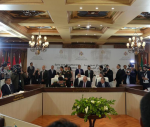You are here
‘November conference to address challenges facing SMEs’
By Dana Al Emam - Oct 07,2014 - Last updated at Oct 07,2014
AMMAN — With the participation of more than 150 organisations, a national conference is scheduled to be held in November to discuss matters related to small- and medium-sized enterprises (SMEs) and their funding methods, organisers said.
The gathering is organised by the Kuwait-based Arab Planning Institute (API), in cooperation with the Planning Ministry and the Development and Employment Fund (DEF), Abdullah Freij, DEF director general, told The Jordan Times on Thursday.
“The conference seeks to develop SMEs in light of the 2025 economic vision and to help fund beneficiaries, especially residents of underprivileged areas,” he said on the sidelines of a DEF training on funding SMEs, adding that the conference will feature local and regional success stories.
The week-long training, targeting 30 participants from several SME funding bodies and DEF beneficiaries, was held by API in cooperation with DEF, and aimed to familiarise participants with the role of SMEs in boosting social and economic development.
“The training also addressed the challenges facing the sector... especially how to secure suitable funding for the projects,” Ihab Magableh, senior expert at API, told The Jordan Times.
Aside from banks, Jordan has around 22 institutions that fund SMEs, with over 15 organisations that provide technical support to those wishing to start their own businesses, he said, citing the lack of a comprehensive system of services for SMEs as the main issue that hinders the development of the sector.
Magableh added that funding institutions set “tough conditions” that few entrepreneurs are able to meet to receive financial support.
Speaking to The Jordan Times, API Deputy Director General Hussein Talafha said SMEs are a “vital” method to boost production and employment.
“Producing a single job opportunity costs around $20,000 in large enterprises, while in SMEs the same amount produces up to 50 jobs,” he said, adding that entrepreneurs and project owners need to conduct a feasibility study to limit financial risks and failures.
As a nonprofit regional organisation that seeks to boost the region’s economic and social development, API has held training courses in Jordan for over 500 individuals based on requests of governmental and private bodies, Talafha said.
“Our training courses in Jordan have been in the fields of SMEs, labour strategies and the competitiveness of Jordan’s economy,” he said.
Trainee Buthaina Awad, a DEF beneficiary, said the training has helped her choose a suitable funding method for expanding her kindergarten.
“DEF gave me a JD7,000 loan to start my project in Wadi Musa in 1996, in addition to another loan worth JD35,000 in 2008 to expand my project,” she told The Jordan Times.
Awad said her project has “greatly” improved her economic conditions.
Muneer Oneh, another trainee, said the training helped him realise the need for continuous efforts to create a successful project from scratch.
The employee at the Commission for Development of Orphans’ Finances said the training encouraged him to start a unit for SMEs at the commission and to attract ideas for projects as investments.
DEF has so far held three training courses with API, targeting around 100 individuals and up to 18 mediating private and public institutions.
Related Articles
The Development and Employment Fund (DEF) on Thursday concluded a training programme on microfinance for small- and medium-sized enterprises (SMEs).
AMMAN — The Cabinet on Sunday approved support for the Central Bank of Jordan’s programmes that provide liquidity and financing for small- a
The Jordan Chamber of Industry, in cooperation with the Development and Employment Fund (DEF), are holding a training programme this week on institutionalised support for small- and medium-sized enterprises (SMEs), according to a statement issued Monday.
















